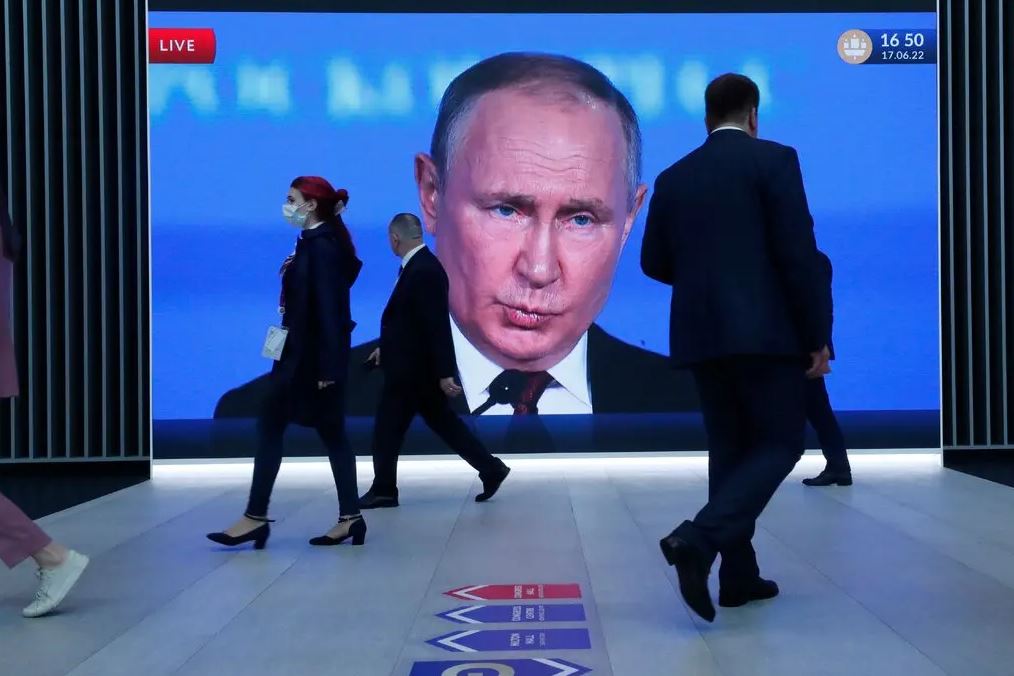When questioned about the possibility of Ukraine obtaining candidate status for the European Union last week, Vladimir V. Putin, the President of Russia, sounded unexpectedly subdued: “We do not have any issues with this.”
Since then, though, Russian authorities and commentators have asserted that Mr. Putin wasn’t being entirely serious when he stated what he said. This week, Russia’s ambassador to the bloc, Vladimir A. Chizhov, was quoted in a state-run newspaper as saying, “We consider the E.U. enlargement process to be negative — hostile, in fact,” in relation to Russian national interests. Chizhov’s comments were made in response to a question about the impact of the enlargement process on Russia.
It was just one more example of the Kremlin’s consistent pattern of sending contradictory messages, which began before the war with unclear postures on whether or not diplomacy might prevent a conflict and continued after the invasion with confusing stances on a possible peace accord. But one thing is abundantly clear: the achievement of candidate status by Ukraine is a watershed moment in Mr. Putin’s fraught and perplexing relationship with the EU, as is the desire of an increasing number of Ukrainians to join it.
The issue of whether or not Ukraine will one day really become a member of the European Union is secondary to the question of how the nation will withstand the ongoing invasion by Russia. This sentiment is shared by both Russians and Ukrainians. It’s possible that this is one of the reasons why Russia’s application to the EU hasn’t been the most talked-about topic there.
However, it is also evident that Mr. Putin has failed to hold the hearts and minds of Ukrainians inside his circle, as seen by the fact that Ukraine wants to identify itself with its neighbours to the west.
According to the story put out by the Kremlin, Washington and London form an anti-Russian axis that is pressuring Brussels to admit Ukraine as a member despite the fact that doing so would be detrimental to the interests of the European Union.
“What is it that Europe will get? In an article that was released on Thursday by RIA Novosti, the Russian official news agency, the question of “Ukraine or its remnants?” was posed. No, Russia will not put up with this because it is fully aware that the European Union is being used as a smokescreen for Anglo-Saxon games being played against Moscow and it will not tolerate this.
In 2013, when Ukraine’s Russia-friendly president at the time, Viktor F. Yanukovych, was in the last stages of negotiating a trade deal with the group, the volatile nature of Ukraine’s relationship with the European Union became obvious for the first time. Instead, Mr. Putin advocated for Ukraine to join a customs union run by Russia that already included the other two members, Belarus and Kazakhstan.
Protests broke out in Kyiv after Ukraine reneged on a deal with Europe after being pressured to do so by Vladimir Putin. These protests eventually led to the pro-Western revolution in Ukraine and the ouster of President Viktor Yanukovych. They also prompted Russia to annex Crimea and incite a separatist war in the east that was supported by Russia.
Many commentators were under the impression that Mr. Putin was speaking nonsense when he said at an economic conference in St. Petersburg the previous week that he had no problem with Ukraine joining the European Union. He said that it would be financially burdensome for the members of the European Union to recognise Ukraine as one of their own, and that European businesses would try to stifle the growth of the Ukrainian economy in order to protect themselves from the emergence of new competitors.
In point of fact, Russian officials have claimed that the extension of the European Union is part of a double threat alongside the expansion of the NATO alliance. Both of these developments are seen as potentially dangerous to Russia. The Russian envoy, Mr. Chizhov, recently said that the union “recently has fallen to the level of an auxiliary military bloc, auxiliary to NATO.” This statement was made to the Izvestiya daily.
Given that it would take years for Ukraine to actually become a member of the bloc, the European Union’s decision to grant the nation candidate status is a “symbolic gesture of support,” according to Kadri Liik, an expert with the European Council on Foreign Relations in Berlin. And despite Russia’s comparison of the EU to NATO, participation in the EU would not automatically provide Ukraine with security assurances in the face of future threats from Moscow. This is despite the fact that EU membership has been compared to NATO.

